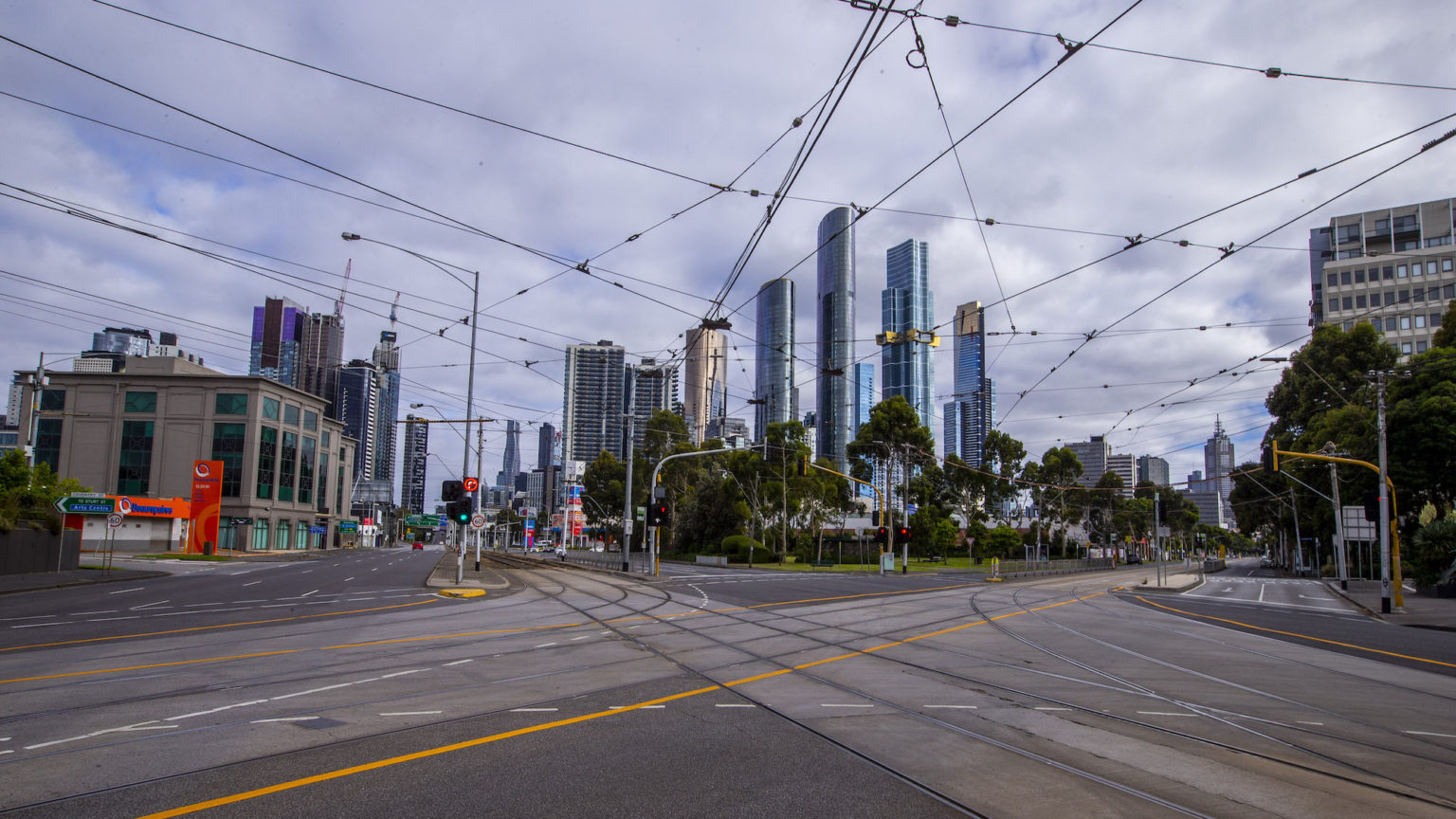Australia shows that Zero Covid doesn’t work
Victoria has been locked down, yet again, in response to a tiny cluster of cases.

Want to read spiked ad-free? Become a spiked supporter.
It must be tempting, from overseas, to see Australia as the country that defeated Covid-19. A land where the suffering of 2020 was worth it, allowing Australians to be free of the restrictions crippling Britain.
Wrong. There has been no victory, and the fear of lockdown permanently hangs over our heads.
For Victorians, it is no longer a threat. The entire state has been thrown into another lockdown since 12 February, with no warning at all, due to one ‘cluster’ of cases. All non-essential businesses are closed, private and public gatherings are banned, and people are locked in the place they live for 22 hours a day. Countless Valentine’s Day plans ruined – for both lovers and businesses that have come to rely on this day to keep themselves afloat.
There are 21 active cases of Covid in the state. Just one new case in the 24 hours to 15 February was locally transmitted. The population of Victoria is over six-and-a-half million. You cannot imagine the shock that went through the community from this snap lockdown in response to so few cases.
This is the reality of the Australian experience. Perth was locked down for five days earlier this month after one person contracted the virus. South Australians had the harshest lockdown this country has seen — including a ban on leaving your home for exercise — after one individual with a positive test result lied to contact tracers about whether he went to a pizza shop to work or to collect a pizza.
Every time a new case of Covid is detected, Australians panic. And we do so due to Australia’s elimination strategy. Australia is pursuing a Zero Covid strategy — the complete removal of Covid from the country, with no reintroduction. We’re not pursuing this officially – no government would openly indulge such a ridiculous proposal – but this is essentially what is happening.
And regular people are paying the price for it. Speaking about losses to the Victorian economy this weekend, Paul Guerra, the chief executive of the Victorian Chamber of Commerce, said: ‘We’ve had estimates north of $500million, nudging that billion-dollar mark.’
This is not an abstract number; this is money lost by business owners, workers and other Australians who suffer yet again for the panicking and incompetence of our government.
The losses do not affect all parts of the community equally. So while florists were forced to close on the biggest day of business in their year, supermarkets, which can sell flowers, were allowed to remain open.
Also allowed to remain open is the Australian Open tennis tournament. The message to Victorians is clear: the only thing standing between you and your normal life is a better slice backhand.
What makes this even more enraging is Australia’s lack of vaccine rollout. Despite assurances from prime minister Scott Morrison that Australia was at the ‘front of the queue’ for vaccines, no one in Australia has received one.
By comparison, the US has administered 53.8million doses, the UK has given at least one dose to 15million citizens, and even Costa Rica is ahead of Australia, with 75,000 doses distributed. Incredibly, Morrison still says our vaccination programme is ‘on track’.
All of this raises a serious question: when can we be sure there will be no more lockdowns? If 20 active cases can send a state into lockdown, what level of vaccine rollout would be needed to make sure we do not have our rights taken away again? Does every citizen need to be vaccinated before we declare it is safe to go back to normal?
This is the danger of an elimination strategy: if the aim is always zero cases, then any outbreak will be seen as intolerable. Lockdowns will always be a proposed — or preferred — policy response.
The correct approach is obvious. A thorough vaccination programme and improving medical capacity. Research from the Institute of Public Affairs, outlined in our report Medical Capacity: An Alternative to Lockdowns, shows that lockdowns are a poor alternative to an approach centred on ensuring medical capacity is up to the demand.
Britons are told lockdowns are necessary. That they work. That they are worth it because the Australian example shows that with enough freedoms removed, enough businesses closed, you can leave lockdown eventually and start to live with dignity again.
This is not true. Because until governments realise that freedoms are worth holding on to, and that life must return to normal even if there are risks, the threat of lockdowns will always be with us.
James Bolt is the manager of online and audio content with the Institute of Public Affairs.
Picture by: Getty.
Who funds spiked? You do
We are funded by you. And in this era of cancel culture and advertiser boycotts, we rely on your donations more than ever. Seventy per cent of our revenue comes from our readers’ donations – the vast majority giving just £5 per month. If you make a regular donation – of £5 a month or £50 a year – you can become a and enjoy:
–Ad-free reading
–Exclusive events
–Access to our comments section
It’s the best way to keep spiked going – and growing. Thank you!












Comments
Want to join the conversation?
Only spiked supporters and patrons, who donate regularly to us, can comment on our articles.